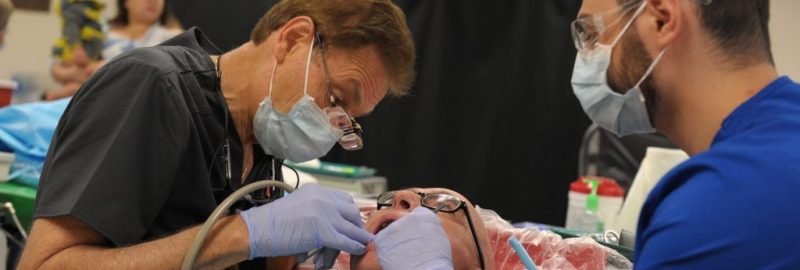
1. What you need to know
The Clinic offers medical, dental, and vision services at no cost. We do not require proof of insurance, employment, income, ID, or immigration status. Everybody is entitled to services. Services are on a first come, first serve basis. Appointments cannot be made in advance. Tickets will be distributed on the morning of each clinic day. If you don’t find all the answers on this page, please call (865) 579-1530
2. What to bring
As you can see, it may be a very long day for you and/or your family, and your comfort is your responsibility. You are not required to bring anything with you. If you bring food, please bring something that will not adversely impact your blood sugar level or your blood pressure. High blood sugar, or high blood pressure levels may prevent us from providing you treatment at the clinic. Wear comfortable clothing. Once inside, there will be designated waiting areas with seats. Bring all of the medications that you take every day and take them just like you normally do. Because you will likely wait outside of the clinic site until the clinic begins, we suggest checking weather conditions and preparing accordingly. We are not responsible for lost or stolen items.
3. What NOT to bring
THE PRESENCE OF ALCOHOL, ILLEGAL DRUGS, OR FIREARMS WILL RESULT IN THE DENIAL OF SERVICE.
4. What services does the Clinic offer?
DENTAL: Cleaning, fillings, extractions
VISION: Complete dilated eye exams, testing for glaucoma, testing for diabetic retinopathy, and glasses made onsite.
MEDICAL: medical exams, consultations, lifestyle counseling and much more!
NOTE: Due to time constraints, be prepared to choose between DENTAL and VISION services. All patients will have the option of receiving either (1) DENTAL and MEDICAL care, or (2) VISION and MEDICAL care, (not DENTAL and VISION on the same day).
5. Do I need to make an appointment?
The Clinic offers services on a first-come, first-serve basis; therefore, we do not make appointments.
6. How do I get into the clinic?
Individuals seeking care will receive information upon entering the patient parking lot. They will also receive a paper admission ticket.
7. Can I get a ticket for my friend or family member?
Because our services are free and resources are limited, we only give tickets to those physically present at the time of number distribution.
8. What you should know about tooth extractions
Tooth extraction is the removal of a tooth from its respective bone socket. Extractions may be needed for a variety of reasons. Most commonly, teeth are extracted when other options to save the tooth are no longer viable. For a few days following the procedure, you may experience soreness, swelling, bruising, and sensitivity in the affected area. Bleeding from the site may occur over the next 12 to 24 hours and numbness from the local anesthetic used for the procedure may last for a few hours.
It is important that you practice proper aftercare once a tooth is extracted. For the first 24 hours, avoid the affected area when brushing or flossing, but keep the area clean by rinsing your mouth with warm water. After the initial 24 hour period, you may gently brush the area with a soft-bristled toothbrush. Hold an ice pack to the outside of your cheek to help with any swelling and eat soft meals, avoiding crunchy or sticky foods. Consult your dentist regarding the use of over-the-counter pain medications.
Following the procedure avoid spitting, drinking from a straw, smoking, heavy lifting, and strenuous exercise. Also, do not unnecessarily touch or irritate the area. Failure to take proper aftercare steps could result in prolonged or excessive bleeding, delayed healing, severe pain, and even infection. If you experience any of those symptoms, you should contact your dentist immediately or go to the nearest hospital.
9. What you should know about fillings
After removing the decayed portion of a tooth, a dentist will “fill” the affected area using either amalgam or composite; this is known as a filling. Depending on the size and location of the filling, you can expect sensitivity in the tooth that could last anywhere from a few hours to up to 6 months. There may be some pain or discomfort in the tooth from the procedure but it should subside over the next few days. Numbness from the anesthetic may last for a few hours after the procedure.
Aftercare for a filling is relatively simple. You may brush, floss, eat, and drink as normal; however, avoid eating and drinking hot liquids until the numbness from the local anesthetic wears off to prevent accidental bites or burns. If you experience bite or pressure pain, constant severe pain, or if your filling falls out, you should contact your dentist immediately.
